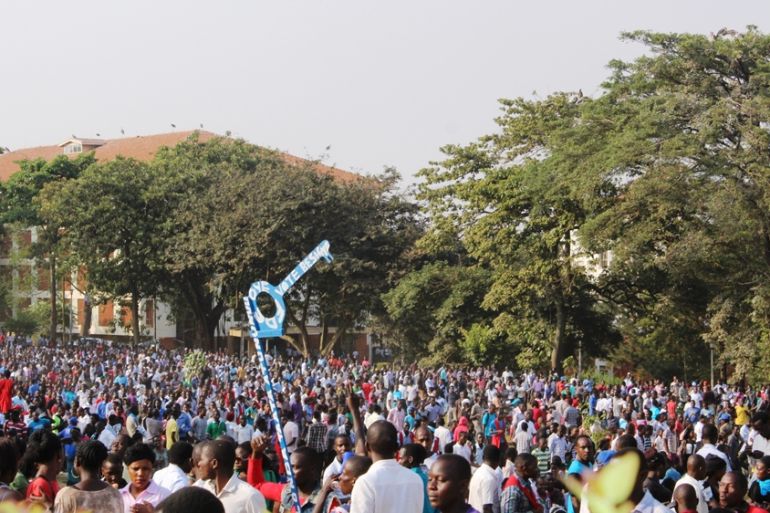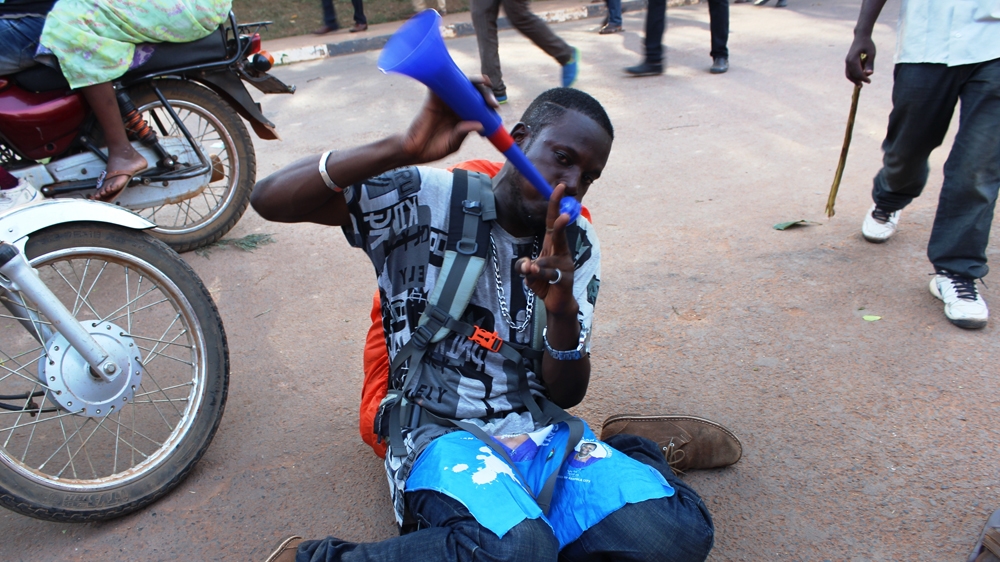Fear and hope surrounds Uganda election
Opposition supporters want an end to the incumbent’s three-decade rule but say they fear a clampdown.

Kampala/Entebbe, Uganda – Plumes of thick black smoke spiral into the air and the crowds start to run. Some are dressed in sleeveless red university graduation gowns, others carry leafy tree branches to symbolise a past war. They are not all students, but they do all want the same thing: to see President Yoweri Museveni relinquish power to Kizza Besigye, the leader of Uganda’s largest opposition party, the Forum for Democratic Change.
Rounds of tear gas are fired at Uganda’s Makerere University to disperse the chanting crowd, who have lit fires and torn down campaign posters featuring the face of the president. Far from the choking fumes, Moses Luyombe, 26, lies on the ground and blows his vuvuzela in defiance, encouraging others to do the same.
The final-year business student says that he wants an end to Museveni’s three-decade rule and hopes to cast his vote in favour of the opposition in Thursday’s parliamentary, presidential and local elections.
“We want change. Since before I was born, Museveni has been in power and he refuses to go. He has done nothing for the youths, we have no jobs after university and they oppress our leaders,” he says.
“We say no more, we want the people’s president [Besigye] in power!” he shouts.
Luyombe blows long and hard.
 |
| A defiant note: Moses Luyombe, a final-year student, flashes the opposition party’s peace sign and blows on his vuvuzela in protests against the president’s 30 year rule [Tendai Marima/Al Jazeera] |
The recent standoff between students and police marks a tense moment at the end of an electoral campaign that has been marred by the occasional tear gassing of gatherings organised by the Forum for Democratic Change, or FDC, and the Go Forward opposition movement, as well as the double arrest of Besigye for leading supporters through the streets of Kampala, the capital.
Election 2016: Young voices from Uganda
Religious leaders continue to pray for peace in the hope that calm will prevail over the vote. But the FDC’s chances seem slim. Walter Chiambete, the party’s executive director of campaigns, believes that, after Besigye’s multiple arrests, the FDC does not stand a fair chance of winning the hotly contested race.
“Throughout this period the ruling party and the security forces have disrupted our campaign trail. We have held rallies as per schedule and with the permission of the Electoral Commission, but we have been frustrated in one way or another so we cannot expect a fair election to take place,” he says.
“As a result of the clampdown just before the campaign’s end, we now fear there could be a low turnout. Many of our supporters might not come out and vote because they are scared there might be violence or they might be intimidated into voting for the NRM [the ruling National Resistance Movement]. Once again, we are not on a fair footing and, with the police, the NRM clearly have the upper-hand.”
Between protest and fear
However, the NRM and government spokesman, Ofwono Opondo, told Al Jazeera that voters have nothing to fear and said necessary measures were being taken to ensure that the polls would be held in a calm environment.
“People should not be afraid, the election will be peaceful and free. If anyone is harassed then they should report the matter to the authorities,” he said. “But we will not tolerate politicians who want to create public panic as a way of campaigning for votes.”
Despite fears of more public unrest and the opposition’s allegations of a sabotaged election, Magnus Taylor, an analyst with the International Crisis Group who specialises in the Horn of Africa, predicts a Museveni win by well over the minimum 50 percent plus one vote threshold.
Taylor told Al Jazeera that suspicions of rigging could make tension in Kampala in particular even worse. But, unlike after the 2011 elections, when thousands of people participated in the Walk to Work marches against Museveni, current political and economic conditions might prevent demonstrations reaching such a critical mass.
“There are a minority of highly motivated opposition of mostly FDC supporters who will likely demonstrate against a Museveni victory. However, I don’t see a critical mass of people joining. In 2011, during Walk to Work protests, the real motivation was the bad economy and high prices of basic necessities, such as food, which in some cases almost doubled in price.
“This time, if Museveni wins, I expect some urban demonstrations, perhaps in places like Kampala, Jinja nearby and Soroti in the north, which inevitably will bring some violence and tear gas, but it won’t be anything like before. There might not be enough popular participation to take it to the next level,” says Taylor.
![A tattered campaign: An opposition supporter walks past posters of President Yoweri Museveni that have been defaced by students [Tendai Marima/Al Jazeera]](/wp-content/uploads/2016/02/b3bfb751bb9a4f0cb2311e7a52d21e82_18.jpeg)
Crime preventers
Far from the protesting crowds of Kampala, some voters not only dread a possible security crackdown, but also possible intimidation by the government’s new volunteer recruits, the crime preventers.
A month before the official campaign began in December 2015, an estimated 200,000 crime preventers were recruited as a community protection unit. However, international rights groups have called for the suspension of the volunteer force, accusing the recruits of physical intimidation, bribery and partisanship. An alliance of human rights groups, including Amnesty International and Human Rights Watch, have strongly criticised the use of the crime preventers during the election, arguing that the unit has no basis in Ugandan law.
However, the government has defended its deployment, saying that the unit has been in place since the 1990s.
Uganda’s crime preventers: Is the government ‘breeding a monster’?
Patrick Mutembo, 43, a former policeman and FDC representative for Entebbe, a small city to the southwest of Kampala, said that he feared the community police force could resort to using hostile tactics on election day.
“The crime preventers are being used to watch people here. If you are in the opposition and you are too vocal then they will come after you.
“I’ve been followed home on two occasions by crime preventers as if they want to scare me or silence me, but I know what they are doing. I was one of them,” he asserts.
Between spoonfuls of his morning porridge, he recalls his time in the police.
“When I was a police officer, if we were told someone had voted two or three times we would arrest them. But if we questioned them and found they had voted for the ruling party, we would let them go after a short while.
“Our orders from above were to secure the position of the incumbent. That is what we did in the last election and maybe they could do it again this time around,” he says.
As 15 million registered voters cast their ballots, many fear the polls will end in public frustration and protest.
Remembering Uganda’s dark past of civil conflict and military rule, Dirisa Namusanga, 32, a boda boda or motorcycle taxi rider in Kampala, says that he hopes there will not be any further unrest if his party of choice, the ruling NRM, is victorious once again.
“I am yellow. Every day I wear this uniform because I want people to vote for the NRM. After many years of war, Uganda has had peace because of the NRM and this time there will be no fighting or protesting because the NRM will be chosen by us, the people,” he says.
Follow Tendai on Twitter @i_amten.